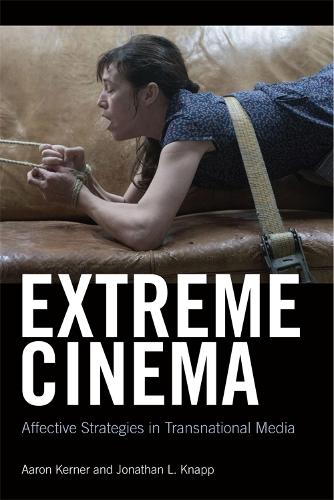
Extreme Cinema: Affective Strategies in Transnational Media
(Paperback)
Publishing Details
Extreme Cinema: Affective Strategies in Transnational Media
By (Author) Aaron Kerner
By (author) Jonathan Knapp
Edinburgh University Press
Edinburgh University Press
8th November 2017
United Kingdom
Classifications
Professional and Scholarly
Non Fiction
Film history, theory or criticism
Film: styles and genres
791.4301
Physical Properties
Paperback
192
Width 156mm, Height 234mm
302g
Description
Extreme Cinema examines the highly stylized treatment of sex and violence in post-millennial transnational cinema, where the governing convention is not the narrative but the spectacle. Using profound experiments in form and composition, including jarring editing, extreme close-ups, visual disorientation and sounds that straddle the boundary between non-diegetic and diegetic registers, this mode of cinema dwells instead on the exhibition of intense violence and an acute intimacy with the sexual body. Interrogating works such as Wetlands and A Serbian Film, as well as the sub-culture of YouTube 'reaction videos', Aaron Michael Kerner and Jonathan L. Knapp demonstrate the way content and form combine in extreme cinema to affectively manipulate the viewing body.
Reviews
This is an exciting and timely book. Through in-depth film analysis, clever reformulation of transnational visual culture, and simultaneous attention to form and affect, Kerner and Knapp open up our world to the intensive capacities of what they judiciously call the "viewing bodies of extreme cinema. -- Tarek Elhaik, University of California, Davis
Author Bio
Aaron Kerner is a Professor and the Director of the School of Cinema at San Francisco State University. His publications include a study of the stupid, Theorizing Stupid Media (2019)exploring cinematic material that does not conform to existing narrative or genre categories. Kerner also published Extreme Cinema (2016). Kerners publications often reflect upon the affective potential of the cinematic. Jonathan L. Knapp is a graduate student in Film and Visual Studies at Harvard University. He spent a decade working at various film festivals, archives, and museums in the San Francisco Bay Area, and completed an MA in Cinema Studies at San Francisco State University. His research is motivated primarily by questions of space, place, and historical traumaexploring the landscape in conjunction with violence, memory, and the spectral.
